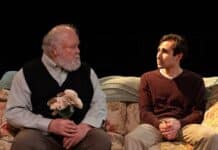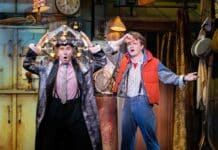The Jungle Book, based on the stories by Rudyard Kipling, is a work that Washington National Opera commissioned for young people both as audience members and as performers.
In their welcome letter to the audience, General Director Timothy O’Leary and Artistic Director Francesca Zambello state:
We want the kids’ first encounter with opera to make an impression, so we make sure they are working with artists at the top of their game. They rehearse and perform alongside members of our acclaimed Cafritz Young Artists Program and members of the WNO Orchestra…. [N]o matter what path they pursue in life, they will leave the experience with an appreciation for the hard work—and great reward—associated with artistic creation.

This production was filled with color and movement (set designer, James Rotondo; costume designer, Erik Teague; lighting designer, Amith Chandrashaker). And every adult audience member, whether parent or not, took joy, pride, and a little anxiety in the proceedings.
In its brisk 80 minutes (including intermission), The Jungle Book covers a lot of existential territory that adults sometimes forget children experience intensely. The narrative addresses such questions as:
How can I be safe when the world has such terrors (and tigers!) in it?
How do I secure to myself the protection of the tribe that I find myself in when I am the only one of my kind in this tribe?
How can I be useful, or important, to the tribe?
How do I get my tribe to love me?
One day, while playing at the edge of his village, Mowgli was trapped by the tiger Shere Khan. Mowgli’s mother intervened and, to save Mowgli’s life, sacrificed her own, dying at the teeth and claws of Shere Khan. Mowgli becomes an orphaned human cub who seeks asylum in the company of a pack of wolves. While debate about whether to allow Mowgli to remain in the wolf tribe proceeds, Mowgli is indoctrinated into the laws of how to conduct one’s life as a member of the tribe. Learning that there is a red flower that kept Shere Khan from actually entering the village where Mowgli and his mother lived, Mowgli decides to obtain the flower for the protection of the wolf pack. Mowgli returns with the flower just as Shere Khan is in the process of seizing one of the wolf cubs. At the sight of the flower, Shere Khan surrenders. Learning that Shere Khan is only mean because he has no pack of his own, the wolf pack offers the tiger the opportunity to be part of their pack.

The production includes large puppets in an eclectic style that we have become used to since The Lion King. Cast members wear and manipulate parts of the puppets. Floating atop long poles, birds fly through the aisles of the theater. Shere Khan — the tiger — is in three parts: two large legs/haunches and one gigantic head, all brilliantly colored and evocatively operated. There is a monkey that rides on a cycle that is propelled by a human partner pushing the bicycle. The wolf pack is composed of members of the Washington National Youth Chorus, who are joined in this production by members of the Taal Academy of Dance.
Kelley Rourke is the librettist for this opera version. The composer is Kamala Sankaram. Francesca Zambello and Brenna Corner co-directed the production, and Shuchi Buch choreographed. Kipling’s authentic affection for India is filtered through the colonial lens he inherited. The opera, which premiered in a shorter form at the Glimmerglass Festival, infuses Kipling’s story of India with “a sonic environment that draws from Indian classical music traditions” that predate European classical music by hundreds of years.
By including some of the students from the Taal Academy of Dance in the cast, Choreographer Shuchi Buch was enable to bring traditional Indian dance and storytelling forms called Bharatanatyam into the production. This brought the audience and performers into more immediate and visceral contact with the musical-physical soul of the Indian storytelling legacy that underlies Kipling’s tale.
All of the cast members were enjoyable, including Nicholas Huff, who, at the performance I attended, stepped in for Sahel Salam and sang the role of Shere Khan from the orchestra pit, while Antonio Montalvo and Chivas Merchant-Buckman, inhabiting the tiger’s puppet/costume, walked the role onstage.
Also in the cast were Vivian Warren and Anoushka Sharma (alternating as Mowgli), Declan Fennell (Little Brother), Kresley Figueroa (Bagheera), Vivian Goodwin (Hyena), Michelle Mariposa (Raksha), and Sergio Martinez (Baloo).
Washington National Opera continues to expand our idea of who opera is for and whose story gets told. With The Jungle Book, this company maintains its commitment to ensuring that the opera stage reflect a larger world than it has in the past.
Running Time: 80 minutes including a 20-minute intermission.
The Jungle Book played December 13 through December 16, 2024, in the Terrace Theater at The Kennedy Center, 2700 F St NW, Washington, DC.
The program for The Jungle Book is online here.
The Jungle Book
Based on the stories by Rudyard Kipling
Music by Kamala Sankaram
Libretto by Kelley Rourke
Co-Directors: Francesca Zambello & Brenna Corner
Conductor: Stephanie Rhodes Russell



